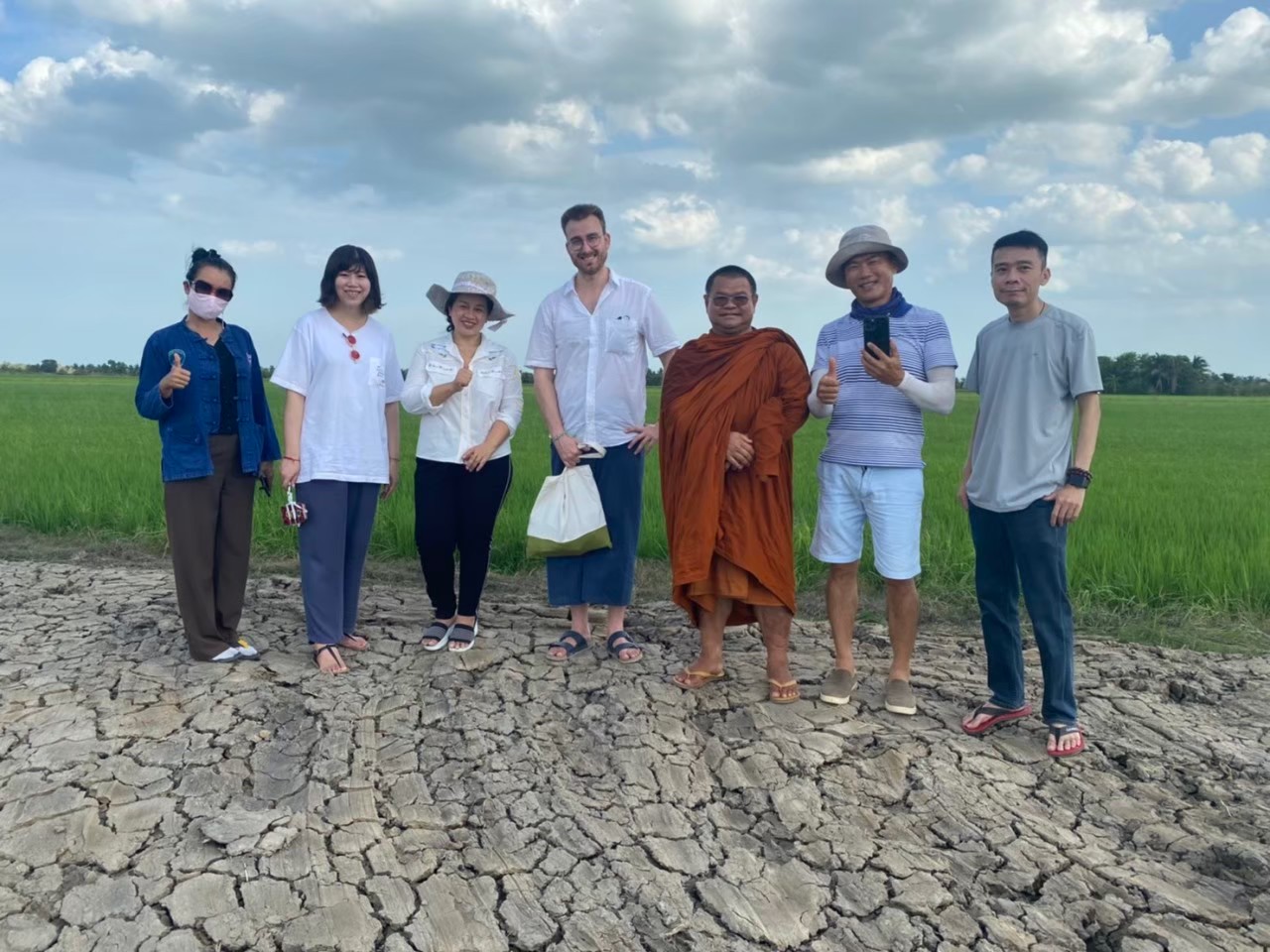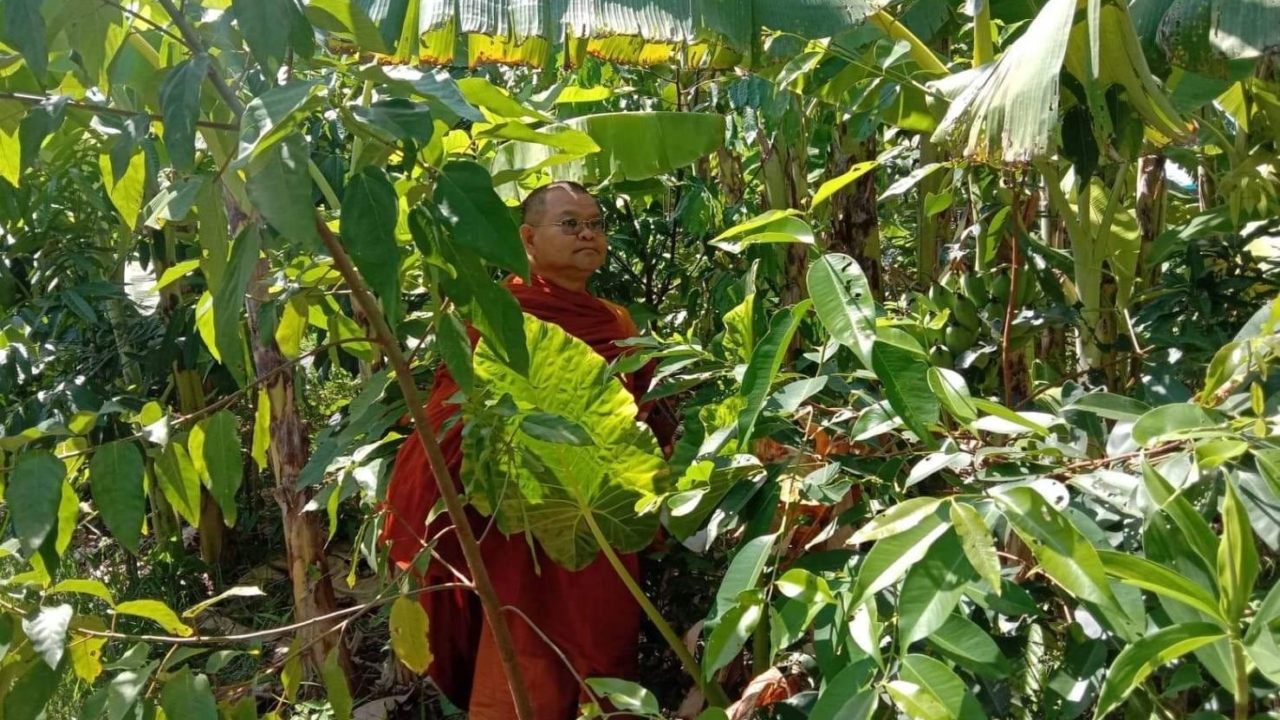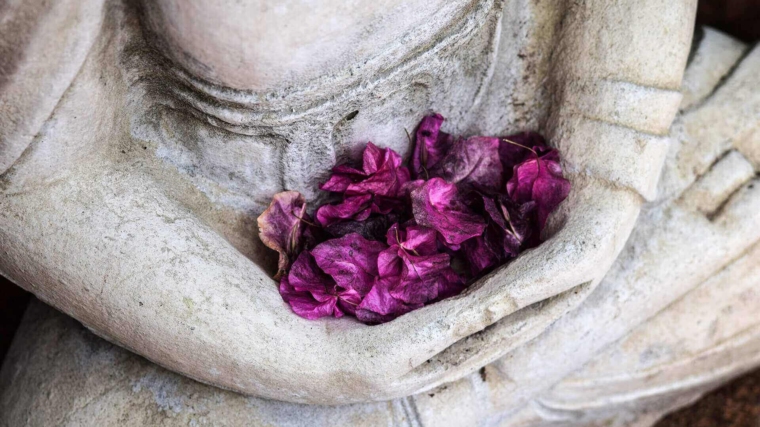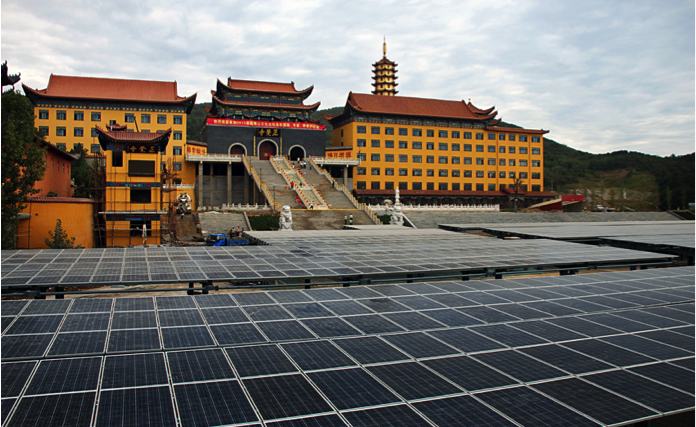Cédric Boudry
June 2021
Kok Nong Na or “New Theory Agriculture”
Over the past year Thai monk Phra Sangkom Thanapanyo Khunsiri has made unprecedented progress in his holistic sustainable development initiative. For over 20 years now, he has been dedicating his time to social development and innovative management. It has been his life goal to give in return to the community, the environment, and to have a positive impact on the world. Having found inspiration in the Buddha’s teachings, and the Sufficiency Economy philosophy and agricultural theories of the late King Rama IX, he has pioneered a new strategy for water management and land use to improve farmers’ lifestyles. Kok Nong Na or “New Theory Agriculture” was promoted by King Rama IX after the 1997 Asian economic crisis. It consists of dividing one’s land into proportionate parts of water founts, re-elevated forested areas for horticulture, rice paddies, and living habitats.
The goal of this design is to shift agriculture away from the intensive corporate, mono-cropping system that attempts to maximize revenue, but often leads to debt for local farmers and making lands infertile. The goal is towards a self-sustainable economy, where farmers can live easily off their own mixed harvests, their own water sources, their own medicinal and convenience plants, while selling only surpluses or natural products for monetary gains.
This framework, however, has not been developed rapidly over the years. One of the main reasons for not fully implementing the king’s model is the transition cost. Since many farmers are indebted due to poor harvests from following the mono-crop system, not many have ventured to try it without some form of aid or guarantee of success. Secondly, strong lobbying from agrochemical and export companies, as well as pro-corporate propaganda promulgated by government ministries have convinced farmers to stick to chemical monocrop cultivation. Thirdly, the idealism and lack of implementation strategies of the king’s model hampered its implementation, especially since all lands are different and need diverse styles of stewardship. Finally, the precariousness of droughts and the unreliability of governmental water sources have made the goal of self-sufficiency seem too abstract and risky.
Foundations in Buddhist Ethics: Sufficiency, Simplisticity & Material-Spiritual Balance
Ultimately, a greater issue is that the moral values of Sufficiency Economy go against the entrenched values of corporate capitalism, known to Buddhists as the three poisons of greed, anger, and delusion. The Buddhist values of sufficiency, simplicity, and material-spiritual balance found in this new system make it unattractive to people who do not have a deep awareness of the source of their problems, and a strong resolve to escape from suffering.
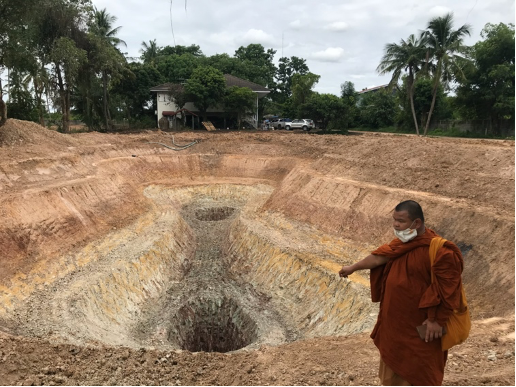
To disentangle these knots, Phra Sangkom, who himself studied agricultural science in college before ordaining as a monk, spent years trying to find a way to apply the king’s philosophy to practical agriculture and to convince people to change. His main contribution to local agriculture was to find a way to maintain water all year long, especially in the arid climate of Northeast Thailand. This would allow farmers to not only plant rice after the rainy season but to grow a variety of crops for themselves all year long. To achieve this, he adopted the practice of digging ground water banks deep enough to pierce the impermeable bedrock and reach aquifers. This allows for heavy rainfalls to fill not only the artificial pools, but also the underground water reservoirs.
With water secured, Phra Sangkom has suggested that people to cultivate a variety of plants on their land, ranging from lumber trees, fruit trees, vegetables, rice and medicinal plants. One of his ideas is “a tree plantation for four benefits”: if you plant many different trees and plants on your land, you will have enough to eat and maintain your shelter; produce everyday commodities like beauty or cleaning products; develop an economic revenue from selling surplus; and participate in climate change mitigation through reforestation. The goal is to create ecological and integrative gardens, cultivated horticulturally in a completely organic way to eschew chemical fertilizers and pesticides. In just a few months, it is possible to grow vegetables and plants.
In a few years, the gardens flourish into green luscious forested areas, where food grows constantly, efficiently eradicating efficiently hunger and poverty. But attaining self-sufficiency is only the first step to wellbeing. Phra Sangkom perceived that to change destructive human practices, a change in mindset is first required. His community development model, based on the concept of boworn (Community, Temple, Education) puts alternative education and spiritual cultivation at its center to build a resilient and compassionate community. To this effect, an important part of Kok Nong Na development rests in teaching Buddhist values of moderation and compassion conjointly to alternative organic no-waste agriculture.
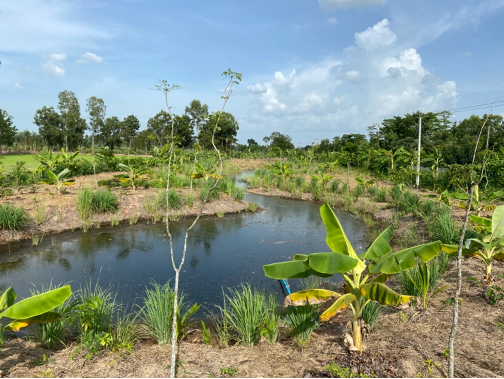
Creating schools for children, seminars for adults, and preaching at the temple are important to build a new and lasting paradigm of co-existence. In fact, implementing Kok Nong Na and living by Sufficiency Economy is difficult for people, as it goes against their social conditioning to desire more. According to Phra Sangkom, to understand that all beings are interconnected and that by choosing a healthy organic and moderate lifestyle, we are positively impacting the earth and its inhabitants is the key to harmony.

Cooperation with the Thai Government & Royal Family
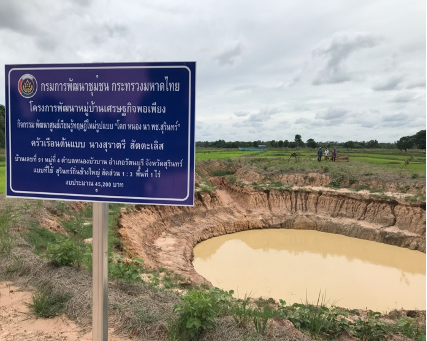
Phra Sangkom has focused his efforts on the developing of this community model first in Doi Pasong in the northern Chiang Mai region of Thailand, where he effectively built an eco-spiritual community. After this first success, he collaborated with Dr. Wiwat Salayakamthon, a former development project planner in the Office of the Royal Development Projects Board. They set up the Mab-Ueang AgriNature Centre in Chon Buri province east of Bangkok, following Sufficiency Economy and Phra Sangkom’s design for sustainable agriculture. There, they opened an alternative boarding school, where children and their families can come live and learn about organic lifestyle they can then apply in their villages. Like dandelions seeds in the wind, they carry this knowledge to spread across the countryside.
Seminars are organized at the center to welcome people of all demographics to experience Kok Nong Na and Sufficiency Economy. This curriculum for self-sufficiency, moral care for the environment, organic farming, and community building has now been replicated around Thailand in many AgriNature Centers to promote self-sufficiency and non-chemical farming. Recently, this curriculum has even been recognized by the royal institution and is being promoted widely throughout the country.
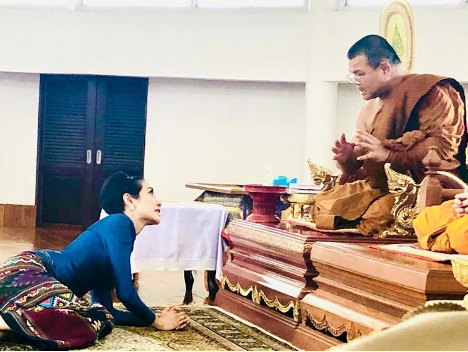
King Rama X’s Royal Noble Consort Sineenat went to meet with Phra Sangkom at his temple next to the Mab-Ueang Center to learn about his work and how he implements Kok Nong Na. Her involvement has led to King Rama X to declare that Kok Nong Na should become a national development goal.
Wishing to pursue his father’s work, King Rama X has made Kok Nong Na a national policy in Thailand to boost the people’s transition into a new style of agriculture. This signifies that the government and the Social Development Department have officially been supporting and promoting the New Agriculture Theory. Government workers all over Thailand are now being trained in Kok Nong Na at the various AgriNature learning centers in order to supervise and coordinate the undertaking of projects. They are attached to subdistricts to act as intermediaries and quality controllers. Thanks to this, farmers who wish to switch from monocropping or rice cultivation can now register at their local government to receive financial support. This aid only covers the cost of digging the water pools with heavy machinery, but it is a good impetus for farmers to make the first step towards self-sufficiency.
In fact, since last year, the number of applicants has exploded, and Kok Nong Na projects are sprouting up in all provinces. This popularity is motivating more and more neophytes from all demographics; from farmers to business millionaires, many people wish to change their lifestyle and contribute to helping the planet. Most recently, King Rama X announced even schools of all levels, from primary to university, need to include Sufficiency Economy philosophy and Kok Nong Na in their curriculum. Even prisoners are receiving a mandatory Kok Nong Na seminar before their release, as a rehabilitation program to reintegrate them into society with new skills and a spiritual mindset.
Kok Nong Na seems to have become an important integrated into Thailand’s development strategy. This structural shift in the fabric of Thailand’s political and social fabric holds the potential to alleviate the state of poverty and suffering in rural areas. By making Kok Nong Na a national policy, the King and the government have officialized an intention to transform Thailand’s international economic stance, as a country that takes to heart the achievement of the United Nations Sustainable Development Goals. According to Phra Sangkom, this new agriculture style solves many problems in a holistic approach.
Shifting the SDG Movement away from Corporates to the Grassroots
Phra Sangkom himself says: “I believe it is going to be the most impactful to mother Earth. It is the answer for SDGs. Even if it’s a big dream, I started it from small activity. And hopefully, everyone who does Kok Nong Na will understand that it is going to be very good for them, very good for their family, and especially it is going to be harmonious to the world.” For now, many people are reticent to shift their agriculture to self-sufficiency, out of fear, ignorance, or pride. Additionally, the vested interests of certain corrupt government bureaus, such as the Ministry of Agriculture and Cooperatives, and agro-chemical corporations will continue to hamper progress, to work against the promotion of a chemical free sustainable lifestyle.
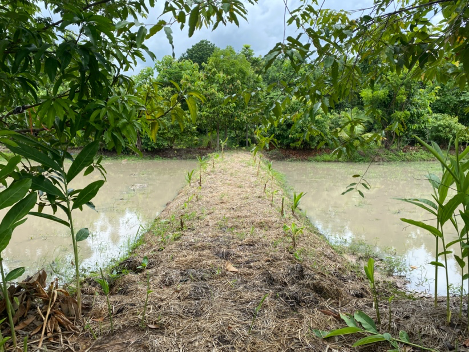
In fact, in 2020, The Bangkok Post was addressing the continued presence of banned dangerous chemicals in analyzed produce, claiming the lack of governmental enforcement of chemical bans is aggravating the already slow shift towards organic farming. It is clear change will continue to be challenged by institutionalized and entrenched forms of power who profit from corruption and misery. But perhaps through greater governmental promotion and support, the number of adherents to Phra Sangkom’s sustainable development vision will grow, just as the bountiful gardens of Kok Nong Na. Hopefully, the transition from a consumption economy and mindset towards a more moderate and sustainable lifestyle will shine a light on a path to a greener tomorrow.
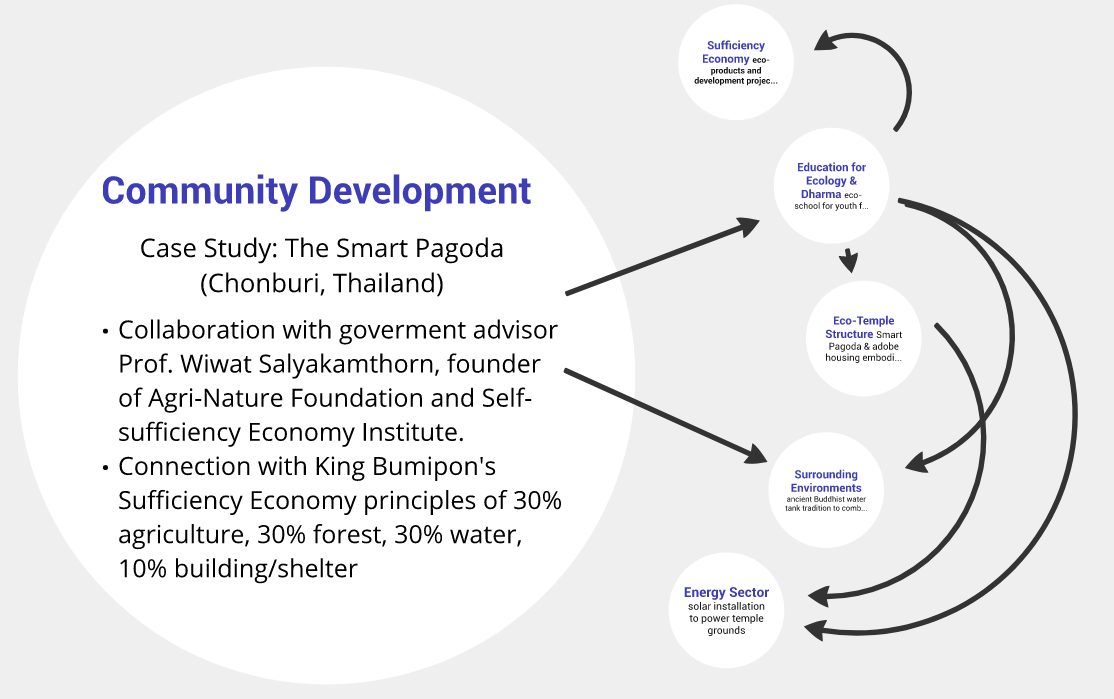
Cédric Boudry is an Asian Studies major who recently graduated from Geneva University, Switzerland. During his time in academia, he has studied social sciences, sustainable development and religious sciences. He is currently a freelance writer for INEB and collaborator with the INEB Eco-Temple development project.
